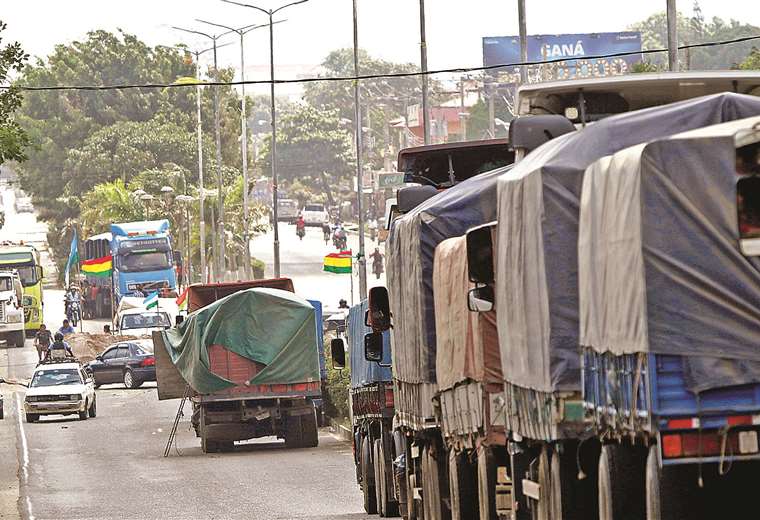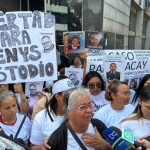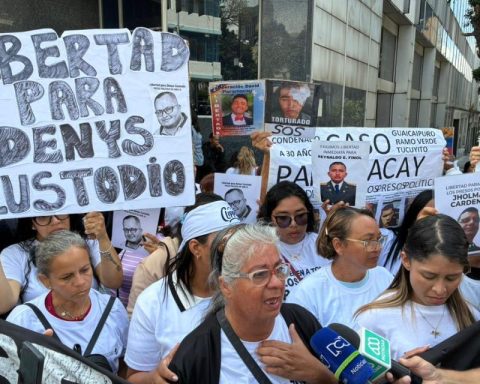October 28, 2022, 4:00 AM
October 28, 2022, 4:00 AM
The scenario remains tense in Bolivia. The crisis generated by the demand for a census in 2023 has affected the national economic sector. In addition to the losses generated by the indefinite strike called by the Inter-institutional Committee, there was the suspension of exports — decided by the Government — and the lack of fuel for the industries, which have fueled the conflict even more. Now the situation is more intensified, yesterday the heavy transport sector announced the closure of the borders for imports if the administration of the president, Luis Arce Catacora, does not lift the veto on foreign trade.
The closure of the border areas is imminent given that the Government maintains its position of suspending exports of non-traditional products such as soybeans, sugar, meat, soybeans and their derivatives, until the indefinite strike is lifted, which for seven days it is complied with in the department of Santa Cruz.
Alfredo Borja, president of the Bolivian Chamber of National and International Transport, confirmed that the border closure will be staggered. The first points to close are Desaguadero and Pisiga.
Yesterday, the carriers decided to block Tambo Quemado, preventing the entry of imported merchandise. The sector assured that the measure adopted by the Government is harmful and announced an indefinite strike.
The carriers were clear, just as the Government does not allow exports, they will block the import of all products that cross the borders.
Determination was coming. In the morning, the International Heavy Transport Association issued a statement where the members of that organization, in coordination with the heavy transport institutions at the national level, declared themselves in emergency and in mobilization “due to the measures taken by the MAS Government of restrict exports of derivatives of soybeans, meat and sugar, coming from Santa Cruz”.
In addition, they assured that this veto does not affect only the eastern region but the entire country. “Not only the carriers of Santa Cruz have their sources of work in the export of products of Cruceño origin, but also the transport of Cochabamba, La Paz, Oruro and Chuquisaca, departments that depend on exports to Chile and Peru”, they indicated in the note.
From Cochabamba, the carriers assured that the Executive’s measure “is restricting our right to work.”
“It has been determined to give a period of 24 hours, (to lift the restrictions) because they take our jobs away from all of us. According to the Minister of Productive Development, the measure is to guarantee supply and that is false,” said Héctor Mercado, leader of the sector in that region.
Speaking to Red Erbol, Gustavo Rivadeneira, representative of the Heavy Transport Chamber of the city of El Alto, reported that more than 1,000 trucks with beef, soybeans and their derivatives are stranded at the borders as a result of the temporary ban imposed by the Government.
The leader asked the National Customs of Bolivia (ANB) that these products can leave the country.
In Desaguadero, border between Bolivia-Peru, according to Rivadeneira, there are about 400 trucks with the products. And in Tambo Quemado and Pisiga, the border between Bolivia and Chile, there are more than 600 vehicles with merchandise that the government has prohibited from exporting.
Under the argument of guaranteeing domestic supply, on Wednesday the Government temporarily suspended the export of soybeans, soybean cake, soybean meal, sugar, oil and meat. The reactions from the business sector were immediate. Different unions questioned the measure, which beyond harming businessmen, affects the State that stops receiving more foreign currency to strengthen the Net International Reserves (RIN).
From the Agricultural Chamber of the East (CAO) they indicated that the suspension is an attack against the productive system and its entire value chain.
Moreover, they maintain that the message lacks veracity, given that the exported products are in surplus, they do not compromise the internal market. “Exports from the agricultural sector in 2022 reach US$3,111 million, a figure as of August, far exceeding exports from the same sector in 2021,” they indicated.
From the CAO they affirmed that there are surpluses in the prohibited products. For example, in soybeans, 80% is industrialized and exported.
“Only the remaining 20% is for the domestic market and the highest percentage is for animal feed. A similar case occurs with sugar and in smaller percentages, but equally important, with beef”, said the CAO.
From the Confederation of Private Entrepreneurs of Bolivia (CEPB) they described the decision as unfair and political. They anticipated “serious consequences on the national economy” because the measure calls into question the seriousness of the country in the international arena.
They stated that the Government’s determination harms small, medium and large producers “who, for no reason, see the sustainability of their sources of work and their investments at risk; also reflecting the lack of will to put an end to a conflict alien to the productive sectors”.
Luis Barbery, president of the CEPB, described this decision as contradictory because with the argument of guaranteeing economic stability, it ends up harming the generation of foreign exchange.
“It’s inexplicable, because it’s like shooting yourself in the foot. The Government urgently needs all the foreign exchange to strengthen our net international reserves and, in this case, if we do not export there is one less source of foreign exchange income”, he said.
The Chamber of Exporters, Logistics and Investment Promotion of Santa Cruz (Cadex) and the National Chamber of Oilseed Industries of Bolivia (Caniob) also questioned the rule.
Osvaldo Barriga, president of Cadex, indicated that the decision is more political than technical and affects more than 14,000 farmers who produce soybeans, of which 80% are small producers who each have 50 hectares.
“It is estimated that 150,000 direct and indirect jobs are generated throughout the soybean chain, which are not only in Santa Cruz, but throughout the country,” he said.
Only the sugarcane agro-industrial sector, according to Barriga, represents 225,000 direct and indirect jobs throughout its production chain and related services.
Jorge Amantegui, president of Caniob, said that it is the Government that, at the beginning and middle of the year, defines the allocations for the internal market and that the industries comply with them, because if they do not do so, they do not obtain the permits to export the surplus.
“Soy by-products (meal, hulls and oil) are in the warehouses; if they do not reach the interior of the country, it is as a result of social conflicts, especially the siege of Santa Cruz”, he said.
The Minister of Productive Development, Néstor Huanca, questioned that the sector speaks only when the temporary ban was established and not during the first days of the civic strike that affects the most humble people.
“They just pronounced themselves, why didn’t they do it at the time? when the strike began that affects the entire population”, he observed and insisted that the temporary suspension seeks to guarantee internal supply.


















